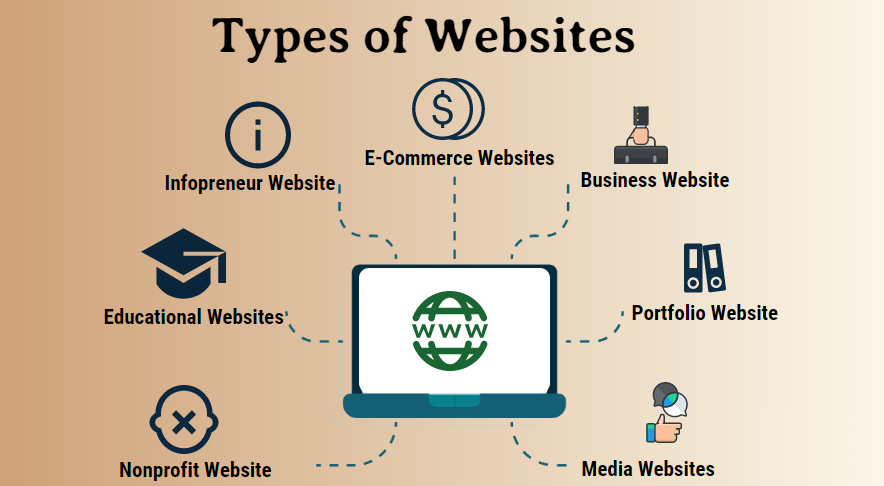There are several types of websites out there, but some are better than others. There are sites that provide information, entertainment, blogging, social networking, and much more. Some cost a fee, and some are free. Which type would you prefer? As websites are becoming increasingly diverse, they offer a variety of services. The options include informational, transactional, entertainment, social media, and community-oriented ones. If you want to create your own website, you’ll need to find an experienced Web Development Agency to help you. They can create any type of website using a variety of programming languages and design tools.
Types of Websites
If you want your website to succeed, you’ll need to optimize it for each type of site. Your audience determines where they click or share your content. The strategy depends on what kind of site it is and how you can reach them. In this article, we will look at some of the types of websites.
Check Out The Full List of Types of Websites There Used Worldwide:-
1. eCommerce Websites:
ECommerce websites are a great way to generate leads and sell products online. By creating an attractive website that is easy to navigate, you will increase conversion rates and attract more shoppers. Additionally, eCommerce websites can be built in any language, so there is no barrier to entry for those who want to start selling online.
Depending on your product category, you may also need marketing materials such as videos or templates for sales pages.
According to a study by Magento, eCommerce websites are on the rise and are expected to reach $2 trillion in annual sales by 2022. This is spearheaded by big data, mobile-first design, artificial intelligence (AI), and cloud-based storage capabilities that make online shopping faster and easier for consumers. eCommerce websites allow you to connect with customers through an intuitive interface that allows them to purchase items easily and efficiently.
2. Blog Website:
A blogging website is a great way to share your thoughts and opinions with the world, and it can be a very lucrative proposition. The key to successful blogging is creating interesting content that attracts readers. This may involve writing about topics that are of interest to you or hot issues of the day. You also need good photo editing skills so that your articles look attractive on all web browsers. Most importantly, you need links! When people click through from your site to another website, this counts as advertising for you and earns you revenue every time it happens.
Make sure to create high-quality images using keywords in the file name so that they appear more prominently when viewers mouse over them on their computers. You can also add custom URLs (uniform resource locators) for direct payouts whenever someone clicks one of these special links from your page. Starting a blog is not as difficult as it seems, but it does take some effort and upfront investments (like time spent writing). However, once up and running, blogs typically generate significant income each month without any real additional effort required other than keeping up with new content ideas – which should always be at the top of your priorities!
3. Personal Website:
A personal website is one of the most important tools that you can have when starting a business. It allows you to connect with potential and current customers, showcase your products and services, and build a professional image. A well-designed website also enables you to easily market your business online and reach new heights. A personal website not only increases sales growth but also helps in building trust between your company and its consumers.
After all, if they are able to access everything that’s available about your company through the comfort of their own home, then there’s no questioning their loyalty or commitment towards it. Nor does an effective website just create passive income; it serves as an essential tool for developing strong relationships with clients who may become long-term advocates for your brand. So whether you’re planning on launching a small business or looking to take your career to the next level, creating a personalized website is key!
4. Business Websites:
A business Website Design & Development is an essential part of any small or medium-sized business. Not only does a well-maintained website help to attract potential customers and partners, but it can also play a pivotal role in SEO (search engine optimization). Your website should be designed with the latest web trends in mind. So make sure that all the elements are functional and user-friendly.
You should also take into account things like site security and layout changes as they happen over time. Finally, you need to track your online visibility on a regular basis to ensure that your site remains competitively relevant.
By taking these simple steps, you can increase traffic levels and improve confidence among current and prospective clients.
5. Informational Website:
A well-written and informative website can be one of the most valuable assets that you have in your marketing arsenal. Not only is it a great way to educate your consumers, but it also establishes credibility and trust with potential clients. Informational websites are typically easy to navigate, packed with relevant information, and fun to look at.
What’s more, informative websites tend not to require a lot of advertising or promotional expenses. In fact, they often generate their own traffic through word-of-mouth recommendations from happy customers. So whether you’re looking for ways to improve the quality of your content or simply want an effective means of promoting your business, investing in an informative website could be a good move!
6. Social Media Websites:
Social media websites like Facebook, Twitter, and Instagram are very important for businesses of all sizes. Not only do they allow you to connect with potential customers directly, but they can also help you to build relationships and improve your brand awareness. Social media websites are a great way to communicate with your target market in a personal manner and learn about their preferences.
Additionally, social media platforms provide an excellent opportunity for promoting your products or services by posting informative content that is relevant to your target audience. In short, social media websites have become an essential part of the marketing mix for any business owner who wants to stay ahead of the competition.
Conclusion:
Types of websites are a big topic that can understand in different ways. This blog provides a comprehensive overview of the different types of websites and how they work. By reading through this blog, you’ll be better equipped to understand the difference between a website and an app, understand the different purposes of a website, and be familiar with the different types of websites that are currently in use.

